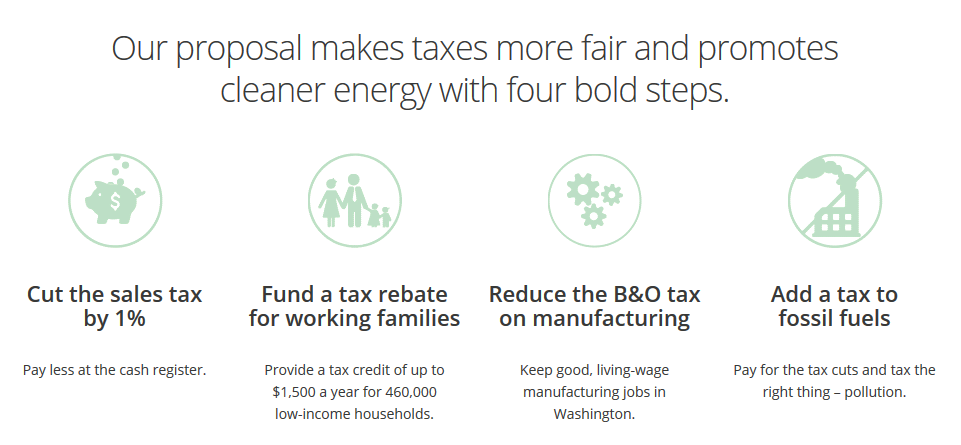Anyone with a lit screen knows by now that shell-shocked Republicans are abandoning the Trump ship in droves. As the exodus threatens to become a stampede, with a longtime GOP operative declaring that “The Republican Party is caught in a theater fire; people are just running to different exits as fast as they can,” talk of election “win probabilities” is pivoting from the presidential race to Congress.
A Trump collapse could give Democrats back the House,” reported Vox this weekend, citing analysis that a mere six-point Clinton plurality could swing the 31 needed seats in its wake. While that’s probably over-optimistic, a more decisive margin over Trump might do the trick.
The ramifications for climate could be huge: Democratic control of both the White House and Congress clears a path for a federal carbon tax without having to somehow vault over GOP denialists. Which could make next month’s ballot referendum in Washington state, Initiative 732, even more momentous. Enacting the country’s first carbon tax wouldn’t just produce a template for other states; it could spark national legislation establishing a U.S. tax on carbon emissions, perhaps as early as 2017.

Infographic from Yeson732.org. The revenue-neutral carbon tax design has turned off some Washington-state climate advocates.
Let’s be clear: a U.S. carbon tax isn’t just helpful climate policy. It’s the core of any program for shrinking carbon emissions massively, relentlessly and globally. Only a briskly rising carbon tax rewards and thus bends every investment, decision and behavior toward less use of fossil fuels. Only a carbon tax can be replicated so the world’s nations can meet the commitments they made in Paris a year ago and ratified last month. And only a carbon tax produces revenues that can protect low- and middle-income families as fossil fuel prices rise — as they must to blow open the gates to the renewables-and-efficiency revolution at full scale.
The holistic power of carbon taxing is what motivated the grassroots organizers at an upstart group called Carbon Washington to crisscross the state last year and collect the 350,000 signatures that placed “I-732” on the Nov. 8 ballot. It’s also what makes it vexing that many green groups in the state have refrained from supporting I-732. Some are actively opposing it.
The schism has been covered widely (and insightfully) in recent weeks, most recently by Natasha Geiling in Think Progress. “Opposition to Washington’s historic carbon tax initiative is coming from the unlikeliest of sources,” reads her headline, which then asks, “It’s the only carbon tax on the ballot in the country. So why are some environmental groups fighting it?”
The answers are many. Carbon WA drew up I-732 without consulting fully with the entire spectrum of climate advocates. The design of its carbon tax is more attuned to the market than to government, with the carbon revenues “returned” to households (see graphic) rather than invested directly in clean energy and community remediation. And perhaps the in-state green groups are guided more by local and state concerns while Carbon WA set its sights nationally and globally.
Those points can be parsed endlessly. But the central fact for climate, which the Republican implosion is making more salient daily, is that the fissure in Washington state threatens to sink the initiative and botch our chance to put a carbon tax on the national legislative agenda starting months from now. Polling on I-732 suggests that a deficit in August may have flipped into a slight plus, but a fifth of voters are still undecided, and disunity among climate advocates makes it tougher to seal the deal.
There’s no second chance at this in the Evergreen State. Washington’s legislature has shown no appetite for a carbon tax, and a new referendum can’t get on the ballot until 2018. Organizing in other states has fallen short as well. Whether we like it or not – and the economist in me makes me a big fan – I-732 is the only game going.
The U.S. elections will doubtless take further twists in the final four weeks, but the possibility of debating and actually winning a national carbon tax is suddenly, miraculously upon us. The referendum in Washington state is going to function as the first big test. Whatever its imperfections, the climate movement’s greatest imperative must be to come together and pass I-732.

Greg Rock says
Help us win! Donate and phone bank from anywhere in the county by clicking Volunteer on http://www.yeson632.org
George Donart says
Typo! Should be: http://www.yeson732.org
Paul Gipe says
Thanks Charles. Keep hammering away at this. We just may have a chance of doing it.